Beans and Corn Around the World
Ngā Kōhine e Toru
These activities are based around the story Ngā Kōhine e Toru, in the book Te Whakatipu Kānga, (item number 710880) or download the App or PDF at:
http://hana.co.nz/online/te-whakatipu-kanga/
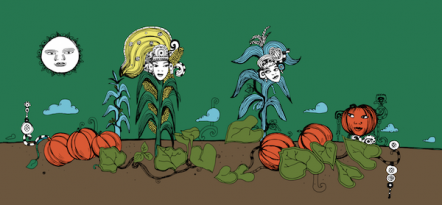
What you need
- Copies of Te Whakatipu Kānga
- Copies of Papapaki 2.PDF (1 per student)
- Art materials
- 12-part story text, cut into strips (Ngā Kōhine e Toru - Kōrero 2 PDF)
Ngā Kōhine e Toru Kōrero 2 (PDF, 40 KB)
What you do
- Read aloud the story Ngā Kōhine e Toru. Share possibly unfamiliar words:
- Wenoweno – te pito o te kāwai o ngā tupu
- Pārae – he horahanga whenua tino nui, he āhua papatahi
- Pūhutihuti – kāore e āta herua te makawe
- Māwhe – kua memeha, kua tata ngaro te tae
- Read the story again. Students retell the story pictorially using the 12-box storyboard (Papapaki -2).
Students recount the story in their own words, using their storyboard as a prompt.
Sequence the Story
- This is a whole class sequencing activity. Students work in pairs. Give each pair a paragraph of the story (Ngā Kōhine e Toru - Kōrero 2 PDF). Groups work together to sequence the story correctly. Class reads the story aloud as they’ve sequenced it.
- Working in pairs or threes, students again work with one paragraph of the story. Pairs act out their section of the story; retell the story as a class in correct sequence.
- Students paint their section of the story. Again, sequence the story, showing art and retelling their section of the story.
Display the art in sequence, students provide a paragraph of text to support their section of the story.
Companion Planting
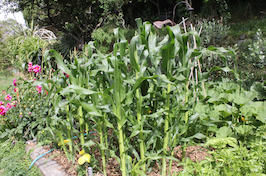
See Hine Raumati, Summer Kai, Taumata 1 for instructions on companion planting of beans, corn and kamokamo.
Growing Bean Sprouts in a CD Case
What you need
- CD case (one per pair)
- Seed raising mix
- Eye-droppers
- Bean seeds
- Water
- Permanent marker pens
- Masking tape
- Ruler
- Chart to record observations
- Copies of Whakatipu Pihi Pīni 2. PDF
Whakatipu Pihi Pīni 2 (PDF, 23 KB)
What you do
- Any bean will do, but the bigger ones are easier to see.
- The hinges of the CD case should be at the top. This stops the dirt from falling out and leaves a hole at the top for watering.
- Plant your bean high in the soil, with the concave side down. (If you plant it too low in the case, the roots will grow out the base.)
- Tape the bottom shut. This will keep roots from growing out the bottom of the CD.
- Use masking tape and permanent markers to label whose plant is whose.
- At day 5 un-tape the cases overnight so that they can have a little bit of space to grow. Tape them back in the morning. By day 7 or so you can label your plants.
- Record your observations.
Stages
Planting.
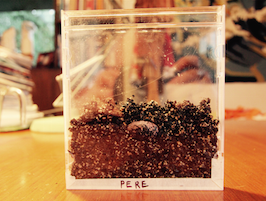
Watering.
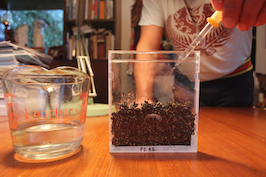
Observing.
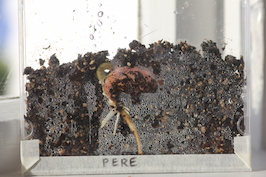
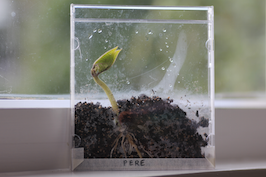
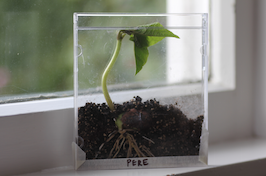
Labeling the parts of the plant.
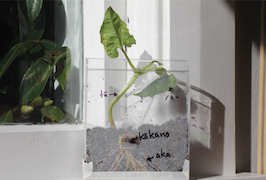
Measuring and recording observations. (Use this table – Whakatipu Pihi Pīni PDF.)
Whakatipu Pihi Pīni 2 (PDF, 23 KB)
Food Festival
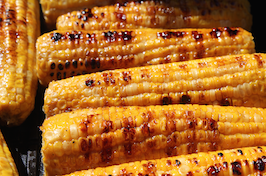
Beans and corn make up the staple diet of millions of people around the world. Organise an international food festival. Here are a few of recipes to get you started.
Black Bean and Cheese Nachos (Mexico)
Ingredients
- Large bag of tortilla chips
- Jar of salsa
- Can of black beans, rinsed and drained
- 250 gm grated cheese
- Small tub of sour cream
Instructions
- Preheat oven to 230°C
- Line a baking dish with aluminum foil (for easy clean up).
- Place tortilla chips into baking dish in a single layer.
- Using a spoon, evenly distribute salsa over tortilla chips.
- Sprinkle evenly with black beans and cheese.
- Bake for about 3–5 minutes, until cheese melts and is bubbly.
- Serve immediately.
Oven Roasted Parmesan Green Beans (Italy)
Ingredients
- 500 gm fresh green beans
- ¼ cup olive oil
- ¼ cup grated Parmesan cheese
- salt and pepper to taste
Instructions
- Preheat oven to 200°C.
- Wash your fresh bean thoroughly. Snap off the ends and place in a large bowl.
- Pour in your olive oil to coat the beans.
- Add parmesan cheese and salt and pepper to taste. Toss to coat.
- Spray a baking tray with non-stick spray or line with baking paper.
- Place beans on the tray, keeping space between the beans.
- Roast the green beans in your oven at 200°C for 20 minutes until your beans are brown; turn at least once while cooking.
Corn Fritters
A favourite dish of children and adults alike! The recipe (and others) are available in He Kānga te Kai.
http://hana.co.nz/online/he-kanga-te-kai/
Corn Chowder
Ingredients
- 2 stalks celery
- Medium onion
- Olive oil
- ½ teaspoon dried thyme
- 1 tablespoon plain flour
- 850 ml milk
- Potato, peeled and cut into little cubes
- 200 gm fresh or frozen corn
- ¼ cup fresh chopped parsley or chives
Instructions
- Chop celery and onion. (Save the celery leaves.)
- Heat the olive oil in a pot over a medium heat.
- Add the celery, onion, and thyme.
- Stir until the vegetables start to colour.
- Sprinkle the flour over the veggies and stir for a few more minutes.
- Pour in the milk, add the potato and bring to a gentle simmer.
- Stir so the soup doesn’t stick to the pot.
- Cook for 10 minutes until the potatoes are tender.
- Stir in the corn and celery leaves.
- Bring the soup back to the boil and serve.
Possible Assessment Ideas
Students can:
- Work cooperatively to recall a story they have heard in correct sequence.
- Conduct a simple science experiment and observe and record the outcome.
- Identify and describe the germination process of a bean plant.
- Identify the conditions needed in seed germination.
- Peer assess by telling each other the steps in the recipes they make.
- Produce a storyboard showing the steps involved in making a dish.
- Cook and serve a corn and bean feast for an international/seasonal food festival.
